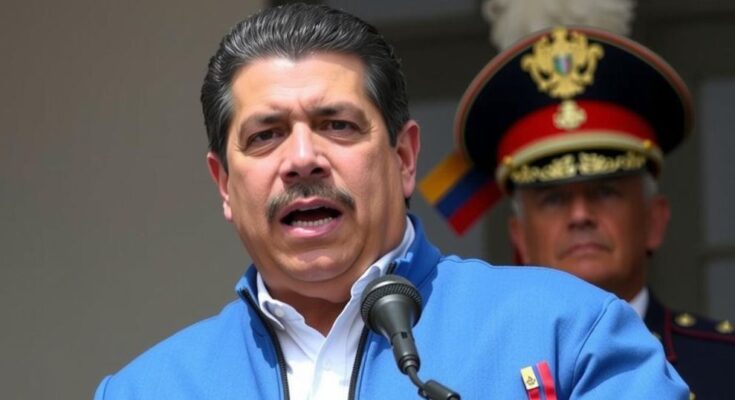Nicolás Maduro has been sworn in for a third presidential term amid international rejection of election results and ongoing political unrest. His inauguration follows the arrest of opposition leader María Corina Machado and raises concerns over human rights abuses. Despite the Electoral Council declaring him the official winner, many in the global community view his presidency as illegitimate.
Nicolás Maduro was inaugurated for a third presidential term on Friday, following elections that were marred by controversy and widespread claims of electoral fraud. Taking the oath before Venezuela’s National Assembly, President Maduro declared his intention for this new six-year term to be one of peace and prosperity. Despite the announcement of his victory by the national electoral body, many members of the international community, including close neighbors Brazil and Colombia, have rejected the results, claiming that Maduro’s opposition lost the election.
This inauguration comes amidst troubling political tensions in Venezuela, notably with the recent arrest of opposition leader María Corina Machado, who was detained shortly after speaking at a protest. Maduro’s Information Minister, Freddy Nanez, characterized the events as a distraction from media narratives. Furthermore, during his inaugural speech, Maduro asserted, “I swear that this new presidential term will be one of peace, prosperity, equality and new democracy.”
The opposition, led by candidates such as Edmundo González—who fled to Spain—continues to contest Maduro’s legitimacy, pointing to the illegitimacy of the electoral processes that rendered him victor. Additionally, reports have emerged of intimidation tactics being utilized against opposition members, including the recent detention of Carlos Correa, a prominent advocate for press freedom.
As international scrutiny increases, the Maduro administration has positioned itself defensively, issuing arrest warrants for opposition figures and alleging collusion against the government.
Amidst this climate of tension, the United Nations has expressed serious concerns regarding human rights violations and the suppression of dissenting voice within Venezuela.
The political landscape in Venezuela has been turbulent for several years, particularly under Nicolás Maduro’s leadership. Following former President Hugo Chávez’s death in 2013, Maduro’s presidency has been marked by accusations of autocracy, human rights abuses, and a collapsing economy. The 2023 elections were contested by opposition leaders and criticized by many nations as lacking credibility, with mounting evidence of electoral fraud and government repression. These events have led to a significant migration crisis and humanitarian challenges within the country, prompting calls for international intervention.
In summary, Nicolás Maduro’s controversial inauguration for a third term underscores ongoing political instability within Venezuela. The opposition’s rejection of the election results, alongside international concerns regarding human rights violations, casts a shadow over Maduro’s claims of legitimacy. As tensions escalate, the situation warrants close observation, especially regarding the treatment of dissent and the broader implications for Venezuelan society and governance.
Original Source: www.bbc.com




